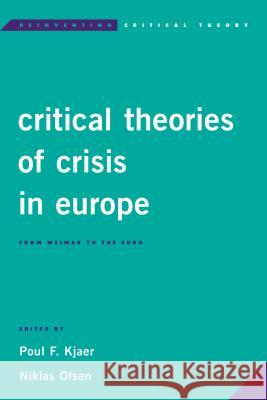Critical Theories of Crisis in Europe: From Weimar to the Euro » książka
Critical Theories of Crisis in Europe: From Weimar to the Euro
ISBN-13: 9781783487462 / Angielski / Miękka / 2016 / 272 str.
Critical Theories of Crisis in Europe: From Weimar to the Euro
ISBN-13: 9781783487462 / Angielski / Miękka / 2016 / 272 str.
(netto: 198,94 VAT: 5%)
Najniższa cena z 30 dni: 207,60
ok. 30 dni roboczych
Dostawa w 2026 r.
Darmowa dostawa!
What is to be learned from the chaotic downfall of the Weimar Republic and the erosion of European liberal statehood in the interwar period vis-a-vis the ongoing Europeancrisis? This book analyses and explains the recurrent emergence of crises in European societies. It asks how previous crises can inform our understanding of the present crisis. The particular perspective advanced is that these crises not only are economic and social crises, but must also be understood as crises of public power, order and authority. In other words, it argues that substantial challenges to the functional and normative setup of democracy and the rule of law were central to the emergence and the unfolding of these crises. The book draws on and adds to the rich crises literature developed within the critical theory tradition to outline a conceptual framework for understanding what societal crises are. The central idea is that societal crises represent a discrepancy between the unfolding of social processes and the institutional frameworks that have been established to normatively stabilize such processes. The crises at issue emerged in periods characterized by strong social, economic and technological transformations as well as situations of political upheaval. As such, the crises represented moments where the existing functional and normative grid of society, as embodied in notions of public order and authority, were severely challenged and in many instances undermined. Seen in this perspective, the book reconstructs how crises unfolded, how they were experienced, and what kind of responses the specific crises in question provoked."











